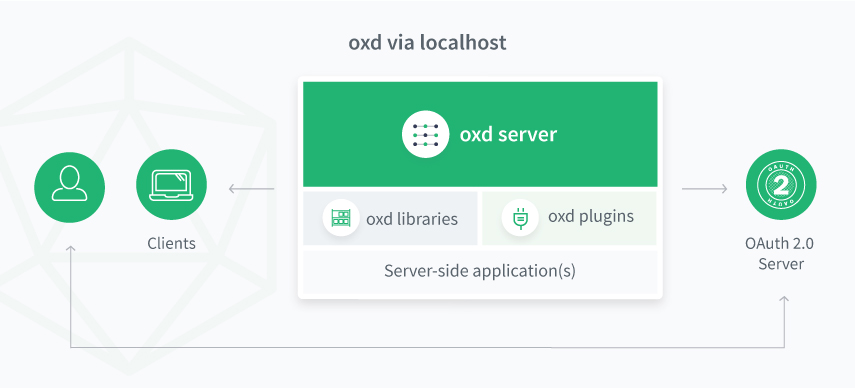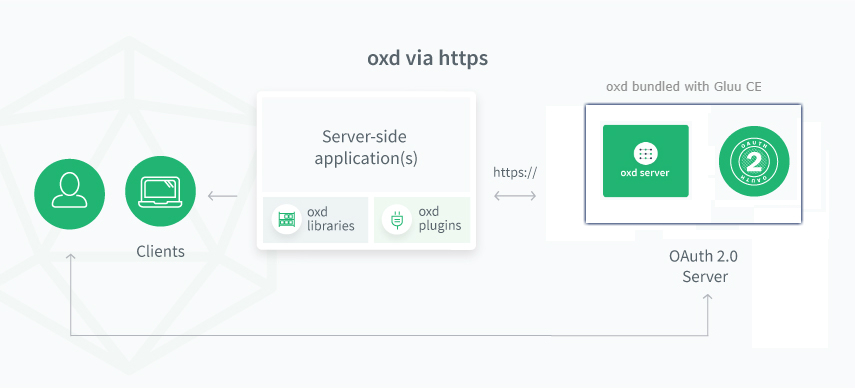oxd 3.1.4 Documentation#
Introduction#
oxd exposes simple, static APIs web application developers can use to implement user authentication and authorization against an OAuth 2.0 authorization server like Gluu.
Architecture#
The oxd Linux package includes the core oxd-server and the optional oxd-https-extension. Web applications can leverage the oxd APIs via localhost with the oxd-server or over the web with the https-extension.
oxd-server#
oxd-server is designed to work as a standalone service daemon via sockets. By default, oxd must be installed on the same host as the web application it is securing.

https-extension (optional)#
When enabled, the https-extension enables secure communication to oxd APIs over the web, making it possible for many apps across many servers to leverage a central oxd service for OAuth 2.0 security.

Benefits#
oxd offers operational and security benefits for developers and organizations:
- oxd centralizes and standardizes secure OAuth 2.0 implementations across heterogeneous web application environments
- When OAuth 2.0 vulnerabilities are discovered, simply update the oxd package--applications never have to be changed or regression tested
- oxd is written, maintained and supported by OAuth 2.0 security experts
Get Started#
Follow these steps to get started:
-
Install oxd on the same host as your application (or any host if enabling the HTTPS extension)
-
Configure the
oxd-server -
Start the
oxd-server, as described in the installation docs -
Start and configure
oxd-https-extensionto support RESTful calls (Optional) -
In your app(s), call the oxd API using one of the native libraries to securely send users to the central authentication server for sign in
Compatibility#
oxd 3.1.4 has been tested against the following OAuth 2.0 servers:
OpenID Providers (OP)#
UMA Authorization Servers (AS)#
Note
If you have successfully tested oxd against another OP or AS, please email details to sales@gluu.org.
API#
oxd implements the OpenID Connect and UMA 2.0 profiles of OAuth 2.0.
-
The oxd OpenID Connect APIs can be used to send a user to an OpenID Connect Provider (OP) for authentication and to gather identity information ("claims") about the user.
-
The oxd UMA APIs can be used to send a user to an UMA Authorization Server (AS) for access management policy enforcement, for example to centrally manage which people (or software clients) can access which web pages and APIs.
Learn more in the oxd API section of the documentation.
Native Libraries#
oxd native client libraries provide simple and flexible access to the oxd APIs.
Languages:
Frameworks:
Source code#
The oxd source code is available on GitHub.
Support#
Gluu offers free community support for oxd on the Gluu Support Portal.
If you need guaranteed response times, private support, and priority access to our team, Gluu offers a range of VIP support plans.
License#
oxd is available under the AGPL open source license.
FAQ#
What is oxd?
oxd is a mediator: it provides APIs that can be called by a web application that are easier than directly calling the APIs of an OpenID Connect Provider (OP) or an UMA Authorization Server (AS).
What types of applications can use oxd?
oxd only supports server-side web applications. If you are using the Gluu Server as your OP and need single sign-on (SSO) to single-page apps (SPAs), native apps, or SaaS apps, please review the Gluu Server SSO integration guide.
What is the oxd-server?
oxd-server is a standalone service with socket connection. By default it's restricted to localhost (localhost_only: true configuration in oxd-conf.json). It's possible to turn off this restriction if you set localhost_only: false in oxd-conf.json.
What is the oxd-https-extension?
oxd-https-extension is a RESTful Jetty based server which accepts HTTP calls and redirects them to the oxd-server. If you want to connect apps to your oxd server via HTTPS, you can simply start the oxd-https-extension after deploying and configuring your oxd-server.
Where do I deploy oxd-server?
By default, the oxd-server must be deployed on the same server as the web application(s) you want to protect. However, with the oxd-https-extension running, you can deploy a central, robust oxd service on dedicated server(s).
Why should I use oxd?
oxd offers a few key improvements over the traditional model of embedding OAuth 2.0 code in your applications:
-
If new vulnerabilities are discovered in OAuth2/OpenID Connect, oxd is the only component that needs to be updated. The oxd APIs remain the same, so you don't have to change and regression test your applications
-
oxd is written, maintained, and supported by developers who specialize in application security. Because of the complexity of the standards--and the liability associated with poor implementations--it makes sense to rely on professionals who have read the specifications in their entirety and understand how to properly implement the protocols
-
Centralization reduces costs. By using oxd across your IT infrastructure for application security (as opposed to a handful of homegrown and third party OAuth2 client implementations), the surface area for vulnerabilities, issue resolution, and support is significantly reduced. Plus, you who have someone to call if something goes wrong!
Which programming languages and frameworks does oxd have libraries for?
There are oxd libraries for many popular programming languages and frameworks. See above.
How do I get SSO across several websites?
You’ll need two things:
-
A central OpenID Connect Provider (OP) that holds the passwords and user information
-
Websites that use the OpenID Connect protocol to authenticate users
An easy way to accomplish the first--install and configure the free open source Gluu Server using the Linux packages for CentOS, Ubuntu, Debian or Red Hat. Or you can also utilize Google as your OpenID Connect Provider (OP). The second is accomplished by calling the oxd APIs in your applications to send users to the OP for login.
Can I use oxd plugins for social login?
oxd simply makes it easy to send users to an OpenID Connect Provider (OP) for login. If you want to offer users the option to use social login, that needs to be implemented at the OP. If you are using the Gluu Server as your OP, you can use Passport.js to configure and support social login.
Can I use oxd for two-factor authentication (2FA)?
Again, since oxd simply makes it easy to send users to an OpenID Connect Provider (OP) for login, two-factor authentication needs to be enforced at the OP. If you are using the Gluu Server as your OP, there are several built in two-factor authentication mechanisms. Learn more in the Gluu Server authentication guide.
Can I use Google or Microsoft Azure Active Directory as my OpenID Connect Provider?
We have tested and confirmed oxd to work with Google as an OP. Microsoft's OP implementation is not totally standard though, and therefore may require changes or updates to oxd to work.
Can I purchase support for the Gluu Server or oxd?
Yes, for information on paid support, visit our website.